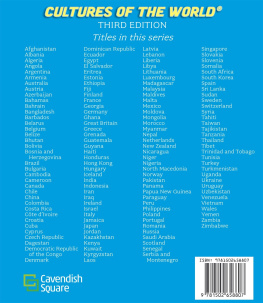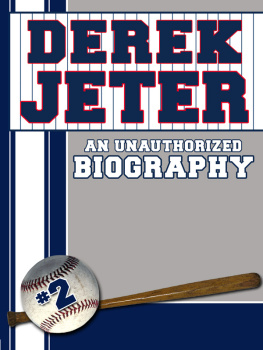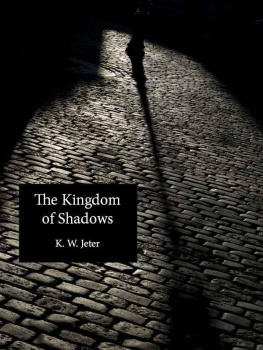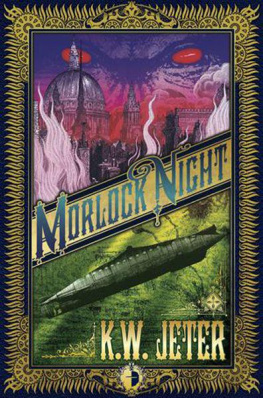K Jeter - Morlock Night
Here you can read online K Jeter - Morlock Night full text of the book (entire story) in english for free. Download pdf and epub, get meaning, cover and reviews about this ebook. genre: Science fiction. Description of the work, (preface) as well as reviews are available. Best literature library LitArk.com created for fans of good reading and offers a wide selection of genres:
Romance novel
Science fiction
Adventure
Detective
Science
History
Home and family
Prose
Art
Politics
Computer
Non-fiction
Religion
Business
Children
Humor
Choose a favorite category and find really read worthwhile books. Enjoy immersion in the world of imagination, feel the emotions of the characters or learn something new for yourself, make an fascinating discovery.

- Book:Morlock Night
- Author:
- Genre:
- Rating:3 / 5
- Favourites:Add to favourites
- Your mark:
- 60
- 1
- 2
- 3
- 4
- 5
Morlock Night: summary, description and annotation
We offer to read an annotation, description, summary or preface (depends on what the author of the book "Morlock Night" wrote himself). If you haven't found the necessary information about the book — write in the comments, we will try to find it.
Morlock Night — read online for free the complete book (whole text) full work
Below is the text of the book, divided by pages. System saving the place of the last page read, allows you to conveniently read the book "Morlock Night" online for free, without having to search again every time where you left off. Put a bookmark, and you can go to the page where you finished reading at any time.
Font size:
Interval:
Bookmark:
Morlock Night
K W Jeter
INTRODUCTION
By Tim Powers
It was K. W. Jeter who, in the letter column of the April 1987 issue of Locus magazine, coined the word "Steampunk" to describe some books he and James Blaylock and I were writing at the time. Cyberpunk was the literary movement current in science fiction then, so Jeter jokingly proposed the new term for our stuff, "based on the appropriate technology of the era".
When I searched for the word on Google this evening, the search engine (almost a Steampunk term right there) returned well over six million results. And though there were precursors, books by Ronald Clark and Michael Moorcock and Harry Harrison, it was Jeter's Morlock Night in 1979 that really started it all all the books and movies about extraordinary gentlemen in capes and top hats scurrying through foggy night-time London on secret errands that involve infernal devices and wonderful machines with elaborate scrollwork on the gears and levers.
I believe it was early in 1976 that Roger Elwood told K. W. Jeter, Ray Nelson and I that a British publisher wanted a series of ten books based on the idea of King Arthur being reincarnated throughout the centuries, obligingly reappearing whenever England needed rescuing. The three of us agreed to write them, and we got together to divvy up history, being sure to leave enough years between adventures for Arthur to have time to be born and grow to adulthood. As I recall, we kind of haggled over various dates, but Jeter came away with the clear claim on Victorian England. I'm glad now that Nelson and I missed grabbing that slot neither of us could have written anything like Morlock Night.
The deal with the British publisher fell apart, but Morlock Night found an American publisher, and then a different British one, and readers on both sides of the Atlantic got to experience Jeter's unique Victorian London.
And it is unique. I think Blaylock might have visited England before he wrote books like Homunculus, but neither Jeter nor I had any first-hand knowledge of the place. Nevertheless, Blaylock, Jeter and I spent many afternoons over endless pitchers of beer in a bar called O'Hara's, hatching extravagant science fiction and fantasy plots set in London as we variously imagined it.
Jeter discovered the priceless source book, Henry Mayhew's London Labour and London Poor, and Blaylock and I made eager use of it too. And when I recently asked Jeter about other sources, he said, "Anything else I probably swiped from reading Victorian novelists, including William Harrison Ainsworth, who was probably the best, or at least the most lurid, of the Victorian 'pulp' novelists, not that that term was used to describe writers like him back then; right at the moment I'm re-reading his GUY FAWKES [] and enjoying it a great deal; quite a reminder of just how damn good were even the Victorian writers who are now considered minor or completely forgotten. Or just flat-out maligned, such as Bulwer-Lytton, who was frankly a great writer, and any snotty little college professor who disagrees can kiss my ass; feel free to quote me in that exact language. George Gissing is considered to have been a fairly serious writer, and I read quite a few of his novels, particularly his early ones, such as DEMOS and THE NETHER WORLD, which are much more grimly Dickensian in tone than his later ones."
In other words, Jeter had a fully-realized London in his head, and if it didn't conform precisely to the actual London of 1895, it derived from richly enhanced contemporary models. The result, Morlock Night, is a book that almost reads as if H. Rider Haggard had written it, rather than a young 20th century Californian.
Almost. Jeter's book bangs along at a much faster pace than Haggard's books did, and the deadpan humor is all Jeter's. The "excitable and unrestrained" character of the Morlocks as they angrily try to work a machine hopelessly beyond their comprehension is wonderful to see, and the impatient banter between Edwin Hocker and Tafe is entertainingly discordant just by the phrasing of Tafe's comments we soon catch on that she's from a more modern time.
Not that it's all beer and skittles, by any means. There are perils, and they're downright apocalyptic. The doom that threatens the world "Nothing comes after this [] And nothing before, either [] My dear fellow [] this is no end to everything, this is everything" is a nightmare vision right out of Philip K. Dick.
But Jeter's London is, as well as dangerous, endlessly colorful and grotesque the underground Lost Coin World, with the vast corroded-together conglomeration of swords and coins and antediluvian submarines known as the Grand Tosh the Edinburgh scholar whose pursuit of Atlantean artifacts has led him to retire forever into the London sewers the malevolent mummy in the castle of Montsegur-!
Without knowing that he was breaking a new trail that would one day be a conduit for lots of books and movies and graphic novels and clothing and jewelry and God knows what all, Jeter in this book pointed out a new and fascinating direction and then even provided the enduring name for it.
I'm glad the book that started it all is back in print for a new generation of readers.
Tim Powers
" and another a quiet, shy man with a beard whom I didn't know, and who, as far as my observation went, never opened his mouth all the evening."
H. G. Wells, The Time Machine1
"An astonishing narrative, don't you think?"
"What? Oh yes. Yes, indeed. Quite incredible." In truth, I hadn't even been aware of the other's presence at my side until he spoke. Darkness and fog had all but swallowed up the landmarks of the city so familiar to me. The prideful namesake of the Lion Brewery had glared down at me as I passed, then was gone; I had thought myself all alone as I walked through the thickening London night air, beneath the gas lamps flaring a sulphurous yellow through the mist. Now my private universe was halved by this quiet-stepping other.
"Incredible?" he echoed and allowed his fine lips to trace the barest motion of a smile. "Perhaps. Perhaps."
Now that I had directed my attention toward him, I was amused that so striking a figure could have paced anywhere near the corner of my eye without forcing himself to the centre of my thoughts. Swathed in an overcoat so black it seemed a hole into which the dim street light poured and was swallowed up indeed, my companion appeared to be an animated fragment of the night itself, with the glossy points of his patent boots the only stars. And the face! A pale moon to be sure! Handsome enough with dark eyes and sensuous mouth beneath lustrous jet hair, but a complexion of such a pallor that I couldn't help wondering what illness or unnatural habits had blanched him thus.
"So you find his story beyond belief, eh?" asked the Pale Man for so I had already begun to identify him in my own mind as we paced farther down the street.
My opinion escaped in a contemptuous snort. "If our host really expected us to believe his outlandish tale," said I, "then he badly misjudged his audience, I'm afraid. A Machine for Travelling through Time! Whizzing along through millions of years to find our descendants divided into cannibalistic brutes below the ground and effete wastrels above! What rot. A very pretty bedtime fable for the pessimistic, atheistic, and socialistic, but no more than that, I'm sure."
"Eh! And is that all-" The Pale Man whipped a slender ebony walking stick from his far side and blocked my progress with it. "Is that all his story signified to you?"
I brushed the stick away from my chest and resumed my walk. My unwanted companion's singular rudeness stiffened the tenor of my voice as I replied, "A cracking good evening's entertainment I thought it, which, supplied with a more uplifting ending, would make a diverting fiction for The Strand. If I find time to put it down on paper I shall certainly submit it to the editors of that periodical. And now, sir-"
Font size:
Interval:
Bookmark:
Similar books «Morlock Night»
Look at similar books to Morlock Night. We have selected literature similar in name and meaning in the hope of providing readers with more options to find new, interesting, not yet read works.
Discussion, reviews of the book Morlock Night and just readers' own opinions. Leave your comments, write what you think about the work, its meaning or the main characters. Specify what exactly you liked and what you didn't like, and why you think so.









